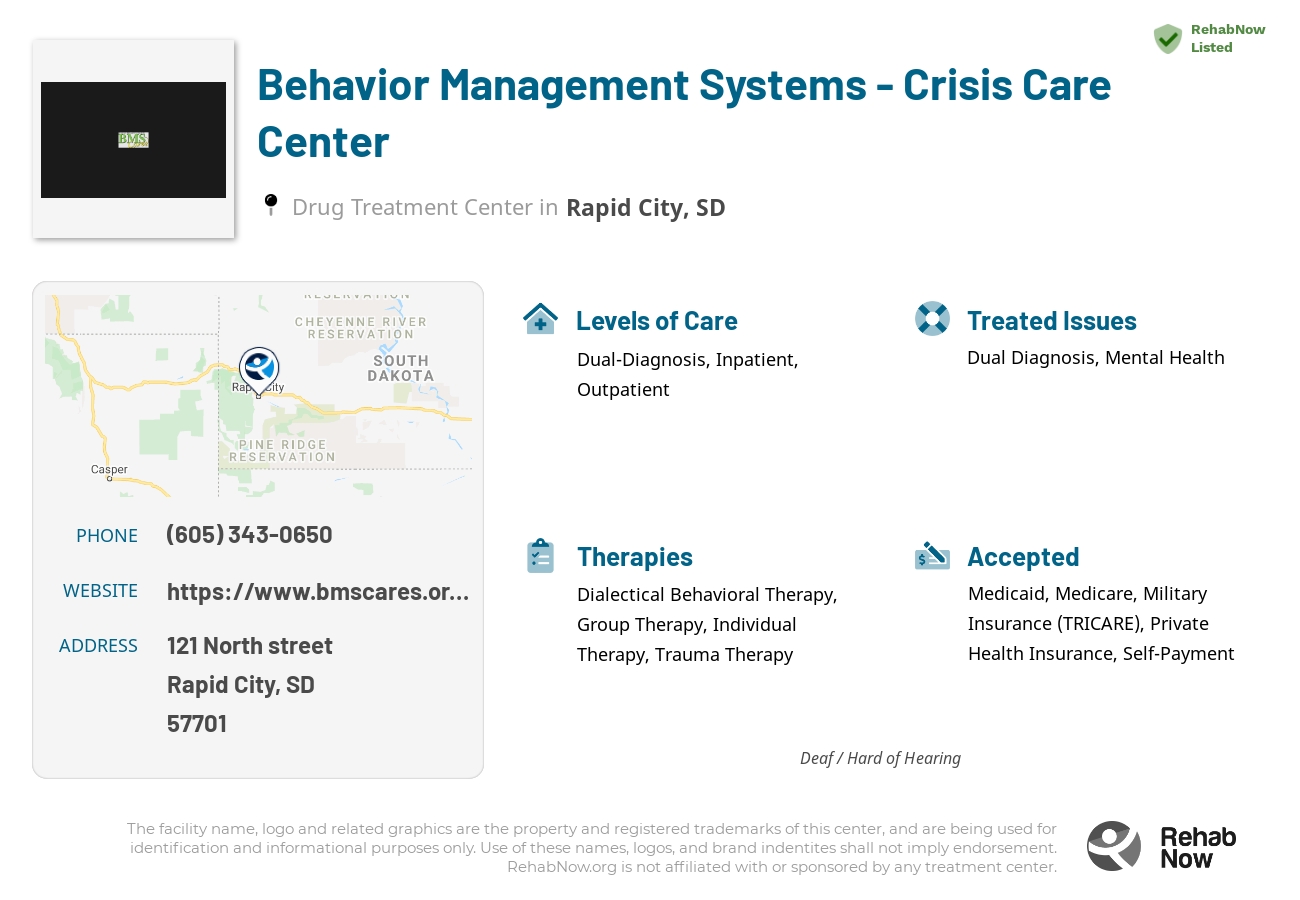Behavior Management Systems - Crisis Care Center
Drug Rehab Center in Rapid City, South Dakota
Behavior Management Systems - Crisis Care Center is an addiction treatment facility in Rapid City, South Dakota that offers Dual-Diagnosis treatment, Inpatient and Outpatient care, and a variety of services including assessment, therapy, medication management, and aftercare plans.
About This South Dakota Facility
Behavior Management Systems - Crisis Care Center is a highly regarded facility in Rapid City, South Dakota that specializes in treating individuals suffering from dual diagnosis of mental health and drug addiction issues. With a mission to provide comprehensive and compassionate care, this treatment center offers a range of programs tailored to meet the unique needs of each individual seeking recovery. They offer dual-diagnosis, inpatient, and outpatient levels of care, ensuring that individuals receive the appropriate treatment based on their specific circumstances. While maintaining a focus on treating drug addiction, Behavior Management Systems - Crisis Care Center also recognizes the importance of addressing mental health concerns simultaneously, providing holistic and integrated treatment to support individuals in achieving long-term sobriety and overall wellness.
Behavior Management Systems - Crisis Care Center provides a wide array of services and treatment methods for addiction and substance abuse. Their approach includes evidence-based practices such as cognitive-behavioral therapy, dialectical behavior therapy, and motivational interviewing. Through individual counseling sessions, group therapy, and educational workshops, individuals gain valuable tools and skills to overcome addiction and build a foundation for lasting recovery. Additionally, Behavior Management Systems - Crisis Care Center offers family therapy, recognizing the importance of involving loved ones in the recovery process and strengthening the support system. With a focus on personalized care, this facility ensures that each individual receives an individualized treatment plan that addresses their unique needs and challenges, fostering a supportive and empowering environment for healing and recovery.
Genders
Ages
Modality
Additional
Conditions and Issues Treated
Dual Diagnosis refers to someone who is both dealing with addiction and another mental health issue.
There are different kinds of Dual Diagnosis: A person who simultaneously experiences both a mental illness and an addiction disorder. Or, a person who experiences one or more coexisting (simultaneous) mental health conditions in addition to a primary substance use disorder.
Some conditions that commonly co-occur with addiction include:
- Personality Disorders (Borderline, Narcissistic)
- Mood Disorders (Bipolar Disorder, Depression, Anxiety Disorder)
- PTSD (Post Traumatic Stress Disorder), OCD (Obsessive Compulsive Disorder), ADHD (Attention Deficit Hyperactivity Disorder)
- Schizophrenia, Psychosis, Hallucinations, Delusions
Levels of Care Offered at Behavior Management Systems - Crisis Care Center
This center offers a variety of custom treatment tailored to individual recovery. Currently available are Dual-Diagnosis, Inpatient, Outpatient, with additional therapies available as listed below.
Individuals who are suffering from severe addiction or have a high risk for dangerous health concerns are often recommended to receive inpatient treatment.
Choosing to enter an inpatient treatment program is beneficial for people who are suffering from severe addiction, or who have a high risk for dangerous health concerns.
Inpatient treatment is beneficial for:
- People who have a history of severe withdrawal.
- People who have attempted to overcome addiction on their own without success.
- People who have a history of relapse, or have recently relapsed.
- People at risk for drug overdose or withdrawal-related complications.
- People with medical conditions that are worsened by drug or alcohol use.
Outpatient treatment programs provide drug and alcohol addiction treatment through individual sessions with a counselor, group therapy, 12-step meetings, and other activities to help individuals gain sober living skills. Most programs are designed for those individuals who have completed a medically supervised detoxification program and provide opportunities for clients to begin the process of early recovery.
Outpatient programs also offer a level of medical support as needed and psychological backing through therapy. Clients are encouraged to live at home, though there may be some flexibility regarding this requirement based on the circumstances and needs of each patient.
Outpatient treatment is perhaps the most common type of dual diagnosis program available. It does not pose a significant financial burden on patients. However, it is essential to note that outpatient treatment does not provide the support and supervision given in residential programs. Some addicts may need this level of support to maintain their sobriety.
Therapies & Programs
Therapy sessions focused on the individual addict can provide much-needed guidance as they work toward overcoming their addiction. These types of sessions typically involve guidance from a therapist, who will help addicts identify and process their feelings and cravings.
During these sessions, addicts may develop plans for coping with the triggers that typically lead to relapse and learn how to avoid those triggers during their recovery process.
Different types of addiction treatment services are available. Within this article, group therapy is of interest due to its high success rate compared to individual therapy. Group therapy settings are beneficial because they allow recovering addicts to build a strong support network.
Benefits of group therapy are:
- Reduces feelings of isolation
- Immediate access to social support in the form of fellow addicts in recovery
- Lowers risk of relapse
- Increases rate of sobriety
- Builds coping skills that can be applied to everyday life
Trauma Therapy is a form of therapy that involves working with a patient to help them process and understand the past trauma(s) in their life. The idea behind it is that while some people can experience traumatic events and not have lasting psychiatric symptoms, many others will. In these cases, memories of the event get hidden from consciousness but continue to influence how the person processes and copes with things in their life. They may avoid situations that resemble what happened or become suddenly angry or irritated to a situation that reminds them of a past event.
With the help of a therapist, people can go back over memories and experiences. This helps them understand why they are having problems coping with certain situations and how they can change how they think and react to things. This therapy is typically done using techniques such as visualization, discussion, and writing down thoughts and feelings.
Trauma therapists will work with clients to help them understand their past and present relationships. Many times, patients may believe that something is inherently wrong with them or that they are unworthy of love. A therapist aims to correct these negative feelings and behaviors by helping the person realize that their actions do not reflect who they truly are.
One of the main goals of trauma therapy is to help clients express their emotions and talk about what they are feeling. This benefits both to increase awareness of how certain events have impacted them in the past and enables patients to realize that they can make changes in their lives.
Dialectical Behavior Therapy is a cognitive-behavioral therapy that helps addicts balance their thoughts and emotions to change their behavior. It was designed for those vulnerable to self-harm and suicidal thoughts and aims to help patients understand the connection between their feelings, emotions, and behaviors. It is effective for those whose addictions and behaviors stem from severe mental health issues.
Cognitive Behavioral Therapy (CBT) is used by drug treatment centers to help addicts comprehend the causes of their substance abuse and the consequences that follow. Through CBT, clients learn to recognize and avoid high-risk situations and cope with challenging situations when they arise.
CBT treatment often includes a combination of individual therapy, group therapy, lectures, and other activities. The treatment’s goal is to help addicts gain self-control and maintain abstinence from drugs and alcohol over the long term so that an addict can get sober and lead a more productive life.
CBT is particularly effective in helping people overcome their drug problems, especially people whose drug abuse is motivated by self-defeating beliefs and emotions.
Payment Options Accepted
For specific insurance or payment methods please contact us.
Is your insurance accepted?
Ask an expert, call (888) 674-0062
Behavior Management System Associated Centers
Discover treatment facilities under the same provider.
- Behavior Management Systems - North Street in Rapid City, SD
- Behavior Management System - Spearfish in Spearfish, SD
- Behavior Management System - Hot Springs in Hot Springs, SD
Learn More About Behavior Management System Centers
Additional Details
Specifics, location, and helpful extra information.
Rapid City, South Dakota 57701 Phone Number(605) 343-0650 Meta DetailsUpdated November 25, 2023
Staff Verified
Patient Reviews
There are no reviews yet. Be the first one to write one.
Rapid City, South Dakota Addiction Information
Although South Dakota is a sparsely populated and somewhat isolated state, it is equally impacted by the national drug epidemic. Substance abuse remains a significant issue that leads to injuries and deaths every year. 17.27% of all deaths between 2008 and 2017 were drug and alcohol-related. Methamphetamines and alcohol are the most commonly abused drug of abuse for those entering treatment in South Dakota.
There were 272 overdose deaths in South Dakota in 2016. This is the highest number on record and more than double from 2015. Alcohol was involved in 36% of all accidents according to the National Highway Traffic Safety Administration (NHTSA), up from 20% in 2015. When looking for a drug treatment facility in Rapid City, South Dakota some of the most common treatment methods include outpatient rehab, dual diagnosis, and aftercare programs.
Treatment in Nearby Cities
- Webster, SD (292.9 mi.)
- Lemmon, SD (138.2 mi.)
- Ree Heights, SD (201.0 mi.)
- Sturgis, SD (26.5 mi.)
- Pine Ridge, SD (80.6 mi.)
Centers near Behavior Management Systems - Crisis Care Center
The facility name, logo and brand are the property and registered trademarks of Behavior Management Systems - Crisis Care Center, and are being used for identification and informational purposes only. Use of these names, logos and brands shall not imply endorsement. RehabNow.org is not affiliated with or sponsored by Behavior Management Systems - Crisis Care Center.









